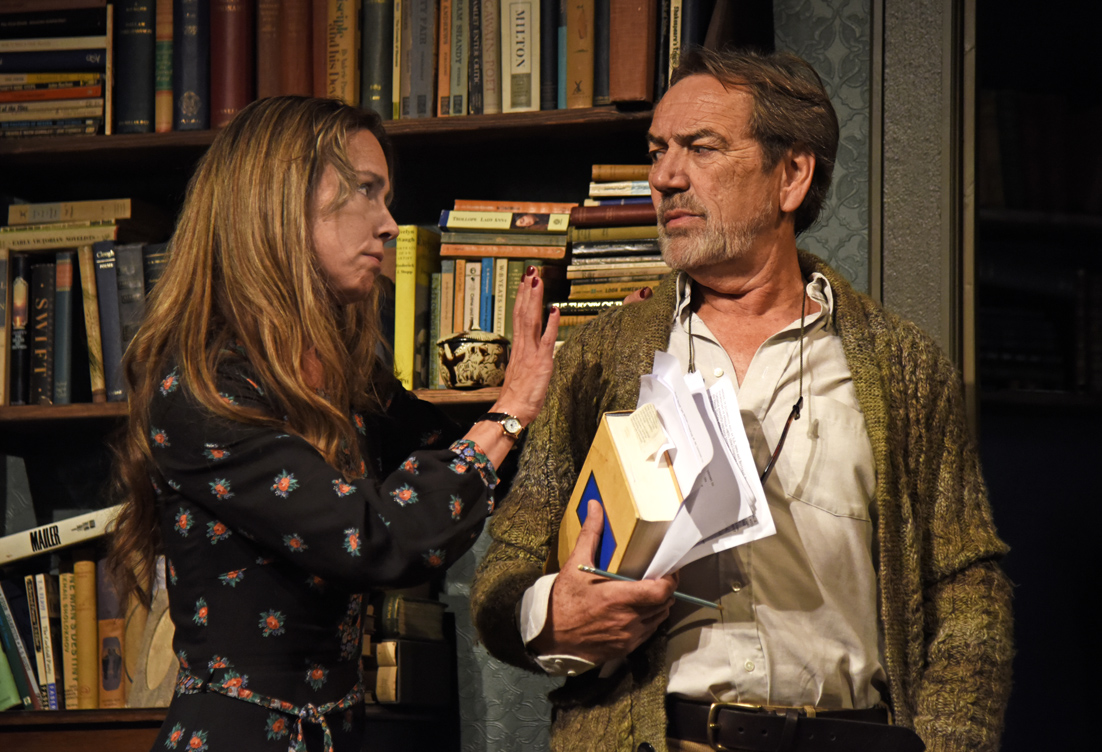 Connoisseurs of Rattigan are apt to find much to commend this play: the naturalistic dialogue and clever plotting being chief amongst its supposed merits. On the debit side we’re bound to note the padding that was inserted to stretch the one act play, originally part of a double bill, ‘After Lydia’, into something long enough to give theatregoers their money’s worth as a standalone piece. Thus we learn of the dramatic early life of the eponymous Lydia as her homeland of Estonia is ravaged by successive waves of Nazis and Russians. In act one there is also some conventional stuff about the relative merits of this or that style of writing, commercial or worthy, of the kind that never fails to lose one’s attention.
Connoisseurs of Rattigan are apt to find much to commend this play: the naturalistic dialogue and clever plotting being chief amongst its supposed merits. On the debit side we’re bound to note the padding that was inserted to stretch the one act play, originally part of a double bill, ‘After Lydia’, into something long enough to give theatregoers their money’s worth as a standalone piece. Thus we learn of the dramatic early life of the eponymous Lydia as her homeland of Estonia is ravaged by successive waves of Nazis and Russians. In act one there is also some conventional stuff about the relative merits of this or that style of writing, commercial or worthy, of the kind that never fails to lose one’s attention.
Things pick up in the second act as the double deception between Lydia and Sebastian plays out. Aided by a complicit doctor each think they are deceiving the other about the true nature of the treatment she has been receiving. Tara FitzGerald gives a complete performance; fluidly and comfortably foreign, gamely – almost tauntingly – flirting with death and maternally protective. She gives as good a drunk as you are likely to find on any stage as she attempts to cope with the inevitable outcome of her, in fact, terminal illness. It is a nuanced and compelling piece of acting with her relationships to each of the other three men being sensitively discrete and acutely observed.
Sebastian (Robert Lindsay) is a critic with one successful novel under his belt. He is a crusty old leftie, a nudge away from being a curmudgeonly old bore, who has by his own admission for the best part of twenty-eight years been in a loveless marriage, which has nevertheless produced a son. However it turns out that only with the discovery of his wife’s condition has he now come to love what he is about to lose. Mr Lindsay’s deceptively relaxed and insouciant character draws one in such that his admission to Mark of his love and concern comes as something of a surprise, both for us and one feels for him.
Julian Wadham, who plays Sebastian’s best friend, Mark, is an actor with a great capacity for suggesting an urbane and sensitive caring, supplemented here by earnest concern for each of the other characters. Apart from anything else the play is delicately seasoned with nudges and winks about sexuality. The son, Joey (Christopher Bonwell) is the result, Lydia suggests, of her expertise gained in the brothel where she met Sebastian after the war. The suggestion being that that was a part of their relationship which had become closed off. The precise nature of Mark’s relationship with both Lydia and Sebastian is never quite nailed down, but a passionate kiss between the two men is clue enough.
Things come to a head when Sebastian fails to turn up to watch the televising of Joey’s play for which he receives a right hook from Lydia. He manages to smooth things over with Joey and the play ends without any particular resolution with father and son playing a game of chess as Lydia is about to go off on a (last) holiday with Mark.
Director Jonathan Church has drawn rich performances from his cast and has produced an eloquent version of this penultimate play from a major figure in mid-twentieth century drama.
★★★☆☆ Graham Wyles 13th October 2018
Photo by Nobby Clark

